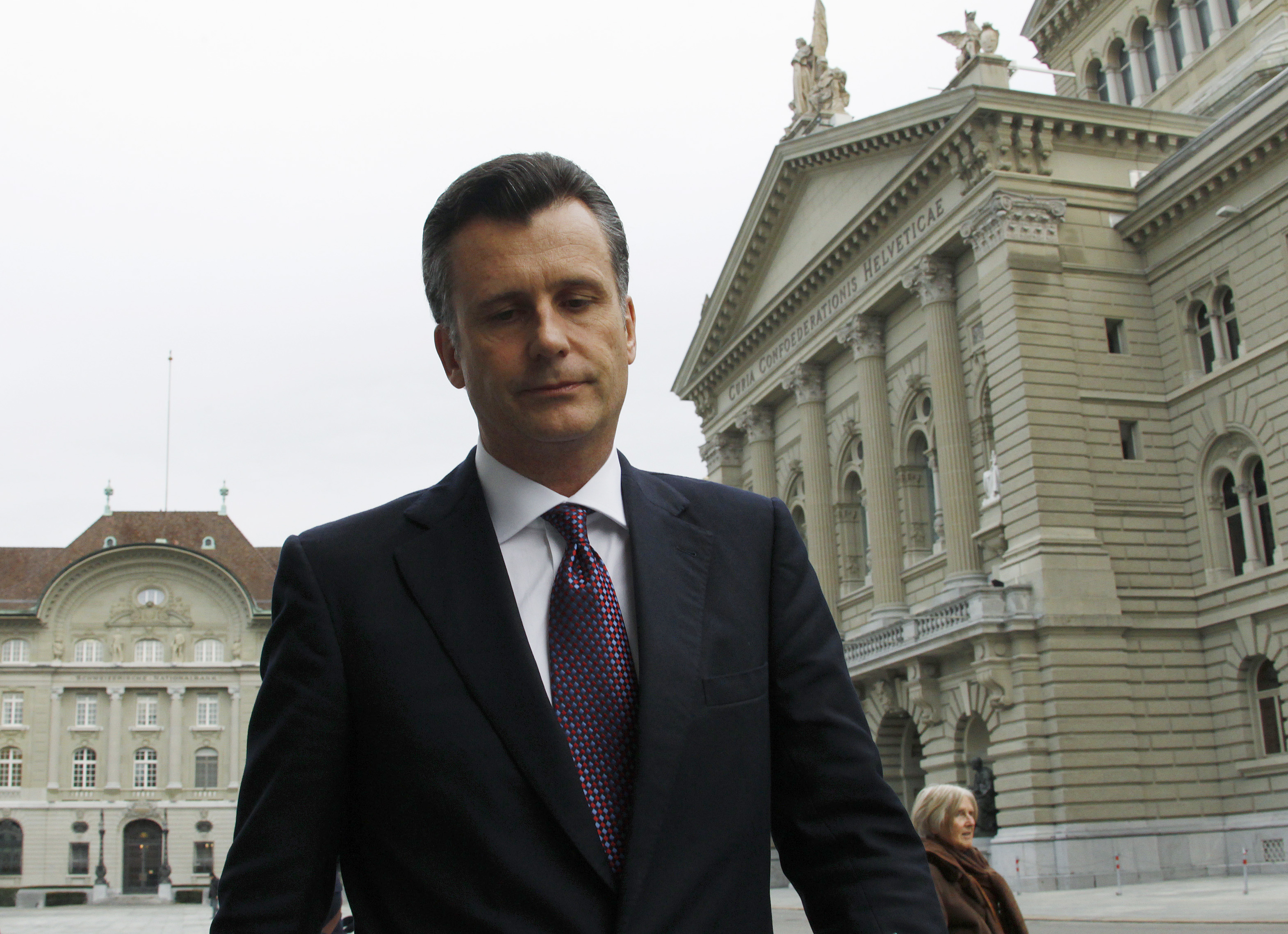Central bank scandal stokes political fires

The recent furore over the Swiss National Bank’s former chairman is not just about banker behaviour – it is also focusing debate once again on banking secrecy.
At the heart of the affair is the leaking of confidential bank data detailing foreign currency exchange transactions by Philipp Hildebrand’s family in breach of Swiss banking secrecy laws.
Zurich police last week opened criminal investigations into two Swiss People’s Party cantonal parliamentarians allegedly involved in the transmission of the data to third parties.
And party vice president Christoph Blocher, who has made no secret of his involvement in alerting the government to suspicions about Hildebrand’s private financial activities, was also interviewed by the police about his role in the affair.
Blocher has long been a vocal critic of Hildebrand’s actions as chairman of the SNB.
In an extraordinary intervention, Economics Minister Johann Schneider-Ammann weighed into the debate, asserting that Hildebrand had been forced to resign as a result of a “year-long campaign” against him and not because he had done anything wrong.
Without naming names, Schneider-Ammann, a member of the centre-right Radical Party, told a Sunday newspaper: “The attacks against Mr Hildebrand were so systematic and so aggressive that you’re talking about a campaign”.
“Mr Hildebrand was often personally lambasted because of the interventions of the national bank … the entire affair must now be brought to light up to the last detail.”
Unravelling the truth
While several people are calling for a parliamentary inquiry into the affair, it will be up to the police to establish exactly how, and by whom, banking secrecy laws were violated in what has become known as the “Hildebrand Affair”.
The IT worker at Bank Sarasin who admitted to taking screen shots of the Hildebrands’ transactions has accused his lawyer (one of those now subject to criminal investigations) of breaching professional secrecy by releasing the information to a third party. The IT worker has said publicly he regrets that the information was used to force Hildebrand’s resignation.
Carlo Lombardini, a Geneva-based lawyer and expert in banking law, told swissinfo.ch that establishing exactly who handled the data and in what circumstances will be key.
“If the lawyer gave the data to someone else it becomes very questionable because banking secrecy protects Mr Hildebrand; the IT worker cannot authorise his lawyer to give the information to someone else,” said Lombardini.
“The final question is Blocher. In my opinion he has probably not committed an offence because the banking secrecy is already violated, the information is already out in the open. It’s not certain, but I think it’s unlikely.”
Double standards
For many commentators, the involvement of Blocher and the People’s Party – always staunch defenders of Swiss banking secrecy laws in the face of pressure from other nations chasing hidden tax revenues – in the affair is the height of hypocrisy.
But the People’s Party has accused the government of hypocrisy in calling for an inquiry into the stolen data, noting in a statement: “It’s the government which has systematically mined banking secrecy in recent years by handing over the data of clients of Swiss banks to the United States”.
Blocher has denied he handled any original banking documents in the Hildebrand matter and has said he merely relayed information to the cabinet. In a speech on Friday evening, he defended his actions over the affair and repeated his criticism of the SNB.
“Everything else aside, it deserves a hard look because it’s a serious thing, going round with stolen data,” Lombardini said.
“Either we agree or we don’t agree with using stolen data. If we think what Blocher did is right, then I would have a hard time criticising what the French or Germans do when they get hold of Swiss banking data because basically it’s the same thing.”
Bullying the bank
Meanwhile, with Hildebrand gone, attention is focusing on the handling of the affair by the SNB which defended him to the last as having done nothing wrong.
While president of the SNB bank council Hansueli Raggenbass has rushed to define new rules covering private financial transactions made by bank employees in the wake of the scandal, some politicians have started calling for his head for what is seen as a failure of oversight at the bank.
Manuel Ammann, professor of finance at St Gallen University and director of the Swiss Institute of Banking, said it was unlikely the affair would have a long-term impact on the reputation of the SNB or banking secrecy laws, despite the high profile of the case.
“Internationally, the concept that the accounts of such a prominent person in such a sensitive position are secret is rather unusual. So the fact that the data was made public is not likely to draw a lot of attention,” Ammann told swissinfo.ch.
Ammann suggested people “at the top” of the SNB had two choices to avoid Hildebrand’s fate: hand their private finances over to a third party – the so-called “blind trust” arrangement – or “put their savings and finances in a bank account entirely in Swiss francs”.
“People at the top of the SNB simply can’t trade in financial markets,” he said.
“What happened at the SNB certainly didn’t help its reputation, but at the same time, I would not expect any long-term damage.”
Bank-client confidentiality protects privacy in accordance with the constitution and laws of Switzerland. Article 13 of the Swiss Federal Constitution confers on every person “the right to receive respect for his/her private and family life”.
The Swiss banker’s professional duty of client confidentiality is codified in Article 47 of the Federal Act on Banks and Savings Banks, which came into force on November 8, 1934. The article stipulates that anyone acting in his capacity as member of a banking body, as a bank employee, agent or liquidator, or as a member of a body or an employee belonging to an accredited auditing institution, is not permitted to divulge information entrusted to him or of which he has been apprised because of his position.
Although people traditionally speak of “banking secrecy”, it is important to note that this duty of discretion is not intended to protect the bank but the client. In that sense, the term “bank-client confidentiality” is much more appropriate.
Source: Swiss Bankers Association
At the end of 2011, a rumour reached the media that SNB chairman Philipp Hildebrand had used his inside knowledge for personal gain.
Details started emerging about an advantageous currency trade made by Hildebrand’s wife Kashya – a Swiss-American dual national. The implication was that she had inside knowledge about the bank’s plans to weaken the franc.
An IT worker at Bank Sarasin has admitted to taking screen shots of the Hildebrands’ accounts. He spoke to a lawyer who arranged a meeting with Christoph Blocher, deputy chairman of the right wing People’s Party. Blocher informed the government.
Hildebrand denied that legally, he had done anything wrong and rejected calls to resign. Four days later, Hildebrand again faced the media, this time to resign after realising he could not prove that he had been unaware of his wife’s transactions.

In compliance with the JTI standards
More: SWI swissinfo.ch certified by the Journalism Trust Initiative












You can find an overview of ongoing debates with our journalists here . Please join us!
If you want to start a conversation about a topic raised in this article or want to report factual errors, email us at english@swissinfo.ch.